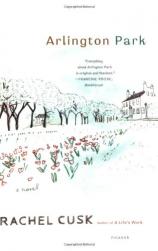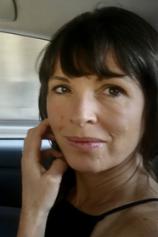Excerpt
Excerpt
Arlington Park: A Novel

Chapter One
All night the rain fell on Arlington Park.
The clouds came from the west: clouds like dark cathedrals, clouds like machines, clouds like black blossoms flowering in the arid starlit sky. They came over the English countryside, sunk in its muddled sleep. They came over the low, populous hills where scatterings of lights throbbed in the darkness. At midnight they reached the city, valiantly glittering in its shallow provincial basin. Unseen, they grew like a second city overhead, thickening, expanding, throwing up their savage monuments, their towers, their monstrous, unpeopled palaces of cloud.
In Arlington Park, people were sleeping. Here and there the houses showed an orange square of light. Cars crept along the deserted roads. A cat leapt from a wall, pouring itself down into the shadows. Silently the clouds filled the sky. The wind picked up. It faintly stirred the branches of the trees, and in the dark, empty park the swings moved back and forth a little. A handful of dried leaves shuffled on the pavement. Down in the city there were still people on the streets, but in Arlington Park they were in their beds, already surrendered to tomorrow. There was no one to see the rain coming, except a couple hurrying down the silent streets on their way back from an evening out.
“I don’t like the look of that,” said the man, peering up. “That’s rain.”
The woman gave an exasperated little laugh.
“You’re the expert on everything tonight, aren’t you?” she said.
They let themselves into their house. The orange light showed for an instant in their doorway and was extinguished again.
On Arlington Rise, where the streetlamps made a tunnel of hard light and the road began its descent down into the city, the wind lifted stray pieces of litter and whirled them around. Further down, the black sky sagged over the darkened shop-fronts. An irascible gust made the signs rattle against the windows. From here the city could be seen, spread out below in the half-splendour of night. A brown haze stood above it. In its heaped centre, cranes and office blocks and the tiny floodlit spires of the cathedral stood out in the dark against the haze. Red and yellow lights moved in little repeating patterns as though they were the lights of an intricate mechanism. All around it, where the suburbs extended to the north and the east, brilliant fields of light undulated over the blackened landscape.
In the centre of the city the pubs and restaurants were closed, but people were queuing outside the nightclubs. When the rain started to fall, a few of the girls shrieked and held their handbags over their heads. The boys laughed uneasily. They hunched their shoulders and put their hands in their pockets. The drops fell from the fathomless darkness and came glittering into the orange light. They fell on the awning of the Luna nightclub and twisted in the beams of the streetlamps. They fell into the melancholy, stained fountain in the square, where men in T-shirts sat with cans of lager and hooded boys made graceful circles in the dark on their skateboards. There were people milling in doorways, shrieking girls in stilettos, boys with sculpted hair, middle-aged men furtively carrying things in plastic bags. A woman in a tight raincoat tick-tacked hurriedly along the pavement, talking into her mobile phone. One of the men by the fountain took off his
T-shirt and rubbed his startled chest in the rain while the others cheered. The traffic moved slowly through the spray. A group of men in a passing car blared their horn at the queuing girls and shouted out the windows as they went by.
The rain fell on the tortuous medieval streets and the grimy Victorian streets and on the big bombed streets where shopping centres had been built. It fell on the hospital and the old theatre and the new multiplex cinema. It fell on multi-storey car parks and office blocks. It fell on fast-food restaurants and pubs with Union Jacks in the windows. It fell on newly built blocks of flats whose windows were still in their plastic wrappers and whose foundations stood in mud, and it fell on their hoardings. Along the river, commercial buildings—insurance buildings and banks—stood one after another, geometric-shaped, and the rain fell in their empty, geometric-shaped plazas. On the black river, under the bridge, swans sheltered from the dark drops amidst the floating rubbish. All along the rain-blackened High Street people were waiting at bus stops: people from desolate parts of the city, from Weston or Hartford, where the rain fell on boarded-up shops and houses and the concrete walkways of insomniac estates. They crowded into the bus shelters, a man with a giant sheaf of dreadlocks, a man with an enormous suitcase, an old lady neatly parcelled into a tweed coat, a couple in tracksuits who kissed and kissed beneath the plastic roof where the rain beat down, so that when the bus came in a great dark arc of water the old lady had to tap the boy on the shoulder and tell them to get on.
The bus went through the rain up Firley Way, which passed from the centre all the way through the suburbs to the retail park, where rain fell on featureless warehouses and superstores and tumbled down in sheets over their empty car parks. It fell on the roofs of darkened garage forecourts. It fell on car showrooms and builders’ merchants. It battered the plastic verandas where supermarket trolleys clung together in long, chattering rows. It fell on the business park, and on the shrubs adorning its desolate roundabout. It fell on the black, submissive fields from which the new places were unrepentantly carved. Over Merrywood shopping mall the rain fell hard on the giant neo-classical roof, so that water streamed down its indifferent façade.
On Arlington Rise the rain was running downhill in the gutters. Below, a kind of vapour hung over the city, muffling the red and yellow lights. The sounds of car horns and a siren rose up the hill from the glittering, steaming heap of the city.
A little further up, around a bend in the road, the vista disappeared. The darkness deepened. The buildings grew more graceful and the pavements more orderly. As the road ascended to Arlington Park the big, brash shops down below were succeeded by florists and antique shops: the off-licences became wine merchants, the fast-food chains became bistros. To either side tree-lined roads began to appear. In the rain these roads had the resilient atmosphere of ancient places. Their large houses stood impassively in the dark, set back amidst their dripping trees. Between them, a last, panoramic glimpse of the city could be seen below: of its eternal red and yellow lights, its pulsing mechanism, its streets always crawling with indiscriminate life. It was a startling view, though not a reassuring one. It was too mercilessly dramatic: with its unrelenting activity it lacked the sense of intermission, the proper stops and pauses of time. The story of life required its stops and its pauses, its days and nights. It didn’t make sense otherwise. But to look at that view you’d think that a human life was meaningless. You’d think that a day meant nothing at all.
The rain fell on Arlington Park, fell on its empty avenues and its well-pruned hedges, on its schools and its churches, on its trees and its gardens. It fell on its Victorian terraces with their darkened windows, on its rows of bay-fronted houses, on its Georgian properties behind their gates, on its maze of tidy streets where the little two-storey houses were painted pretty colours. It fell joyously over the dark, deserted sward of the park, over its neat paths and bushes. It beat down, washing the pavements, sluicing along the drains, drumming on the bonnets of the parked cars. All night it fell, until with a new intensity, just before dawn, it emptied a roaring cascade of water over the houses so that the rain was flung against the darkened windows.
In their sleep they heard it, people lying in their beds: the thunderous noise of the water. It penetrated their dreams, a sound like the sound of uproarious applause. It was as if a great audience were applauding. Louder and louder it grew, this strange, unsettling sound. It filled the night: it rattled the windows and made people turn beneath their covers and children cry in their sleep. It made them feel somehow observed, as if a dark audience had assembled outside and were looking in through the windows, clapping their hands.
Arlington Park: A Novel
- paperback: 256 pages
- Publisher: Picador
- ISBN-10: 0312426720
- ISBN-13: 9780312426729








